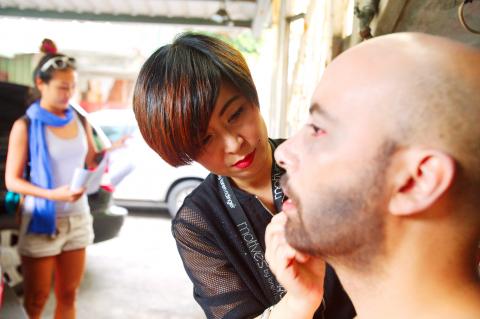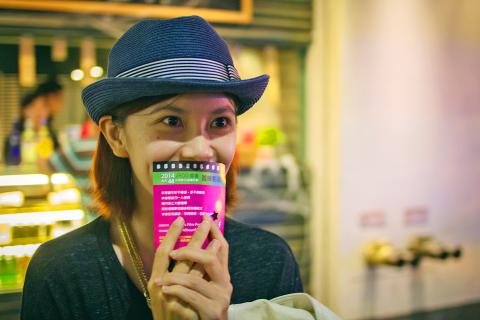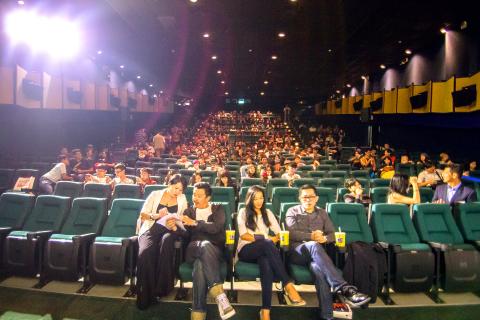Hundreds of excited Taiwanese and expat filmmakers mingled in the slightly worn-down Shin Kong Cineplex (新光影城) in Taipei’s Ximending on Saturday, for the premiere screening of 55 short films submitted for the Taipei 48 Hour Film Project (台北48小時電影比賽計畫).
The annual filmmaking competition, which takes place in multiple cities around the world, was held in Taipei for the second time on the first weekend of this month. Fifty-five teams with over 1,000 participants in total were given a time frame of 48 hours to produce a short, four to seven-minute film based on three criteria — a character, prop and line — all of which were revealed to them 10 minutes prior to the start time.
The venue for the screening may not have been as glamorous as a Hollywood premiere, but it certainly captured the nitty-gritty-ness of the 48HFP. Fittingly, the buzz was not so much on the films themselves, but rather, the amusing back stories behind the exhausting 48-hour race to complete a cinematic masterpiece.

Photo Courtesy of Tobie Openshaw
As participant Jean-Jacques Chen (陳建群) said, “I am still recovering from the challenge three weeks later. It’s like my body’s biochemical composition has changed and I am persistently jetlagged.”
FILMS BEYOND BOUNDARIES
For a challenge like the 48HFP, the process and experience is just as important as the final product.

Photo Courtesy of Jean-Jacques Chen
Actor and radio personality Dennis Nieh (聶雲), who was also this year’s host and organizer, told the Taipei Times, “These types of contests are necessary to incubate the talents for the film industry in Taiwan.”
Nieh, who was raised in California said that the contest provided a solid networking platform for participants — most of whom were semi-professional to professional. He was especially pleased to see a growing number of foreign filmmaking talents in Taiwan and hoped that filmmakers from different backgrounds could learn from each other during competitions like these.
“I want the different cultures to mix and clash with one another,” Nieh added.

Photo Courtesy of Jean-Jacques Chen
Among this year’s participants were seasoned filmmakers with years of experience in the film industries both in Taiwan and abroad.
As long-time Taipei resident and filmmaker Tobie Openshaw, who is originally from South Africa, said: “I myself have not really found a local filmmaker that I feel sufficiently connected to for successful collaboration, but making a film that is a fusion between these different styles might be very interesting.”
Similarly, Canadian filmmaker and former Hollywood producer Paul Despins told the Taipei Times that he always has to concentrate very hard when watching Taiwanese films. He says it’s simply a different way of telling a story.
“If you go into it with a Hollywood mentality, you’re probably not going to enjoy it. So you should approach all films with an open mind,” said Despins.
Adding to that, Chen said he “likes the idea of communication without boundaries.” Hence his decision as director to include four languages in his team’s film — Mandarin, Cantonese, English and French. Chen also joked that the film would have been more comprehensible if they had time to write the subtitles.
WEARING MANY HATS
The film industry in Taiwan might be small in comparison to other markets, but it has its merits. An important advantage is that there are more opportunities for people to try out and learn about the various facets of filmmaking.
“In Hollywood if you’re not a camera person and you touch a camera, it’s against the rules. But in a smaller market like Taiwan, there are more opportunities to try different positions and expand your skill set,” Despins said.
The experience of one of the participants, Liao Yi-chiao (廖苡喬), was the perfect example of this. Although Liao is an actress by profession, her role for the 48HFP was that of camerawoman — and her first time behind the camera was a nerve-wracking yet fruitful experience.
“I was like the Energizer Bunny — I couldn’t sleep” Liao said.
The challenge inspired Liao to seek out similar filmmaking contests where she could assume a different role — like scriptwriting for instance.
“After the challenge was over, I felt like I had the confidence and skills to try out other filmmaking roles,” she said.
While the 48HFP highlighted the benefits of wearing many hats, it also demonstrated that organizational skills and team coordination were equally important. As another participant, Rancy Wang (王元希), who also happens to be the international assistant manager at the Taipei Film Commission said, “You can’t let things drag on. It’s like having a baby — you have nine months and it’s coming, so nourish it well. Likewise, nourish these 48 hours well.”
The 48HFP might be over for this year, but Taiwan’s film industry is ever-growing and evolving. The ideas and collaboration arising from the challenge is only a microcosm of what it could potentially be.

June 23 to June 29 After capturing the walled city of Hsinchu on June 22, 1895, the Japanese hoped to quickly push south and seize control of Taiwan’s entire west coast — but their advance was stalled for more than a month. Not only did local Hakka fighters continue to cause them headaches, resistance forces even attempted to retake the city three times. “We had planned to occupy Anping (Tainan) and Takao (Kaohsiung) as soon as possible, but ever since we took Hsinchu, nearby bandits proclaiming to be ‘righteous people’ (義民) have been destroying train tracks and electrical cables, and gathering in villages

Swooping low over the banks of a Nile River tributary, an aid flight run by retired American military officers released a stream of food-stuffed sacks over a town emptied by fighting in South Sudan, a country wracked by conflict. Last week’s air drop was the latest in a controversial development — private contracting firms led by former US intelligence officers and military veterans delivering aid to some of the world’s deadliest conflict zones, in operations organized with governments that are combatants in the conflicts. The moves are roiling the global aid community, which warns of a more militarized, politicized and profit-seeking trend

The wide-screen spectacle of Formula One gets a gleaming, rip-roaring workout in Joseph Kosinski’s F1, a fine-tuned machine of a movie that, in its most riveting racing scenes, approaches a kind of high-speed splendor. Kosinski, who last endeavored to put moviegoers in the seat of a fighter jet in Top Gun: Maverick, has moved to the open cockpits of Formula One with much the same affection, if not outright need, for speed. A lot of the same team is back. Jerry Bruckheimer produces. Ehren Kruger, a co-writer on Maverick, takes sole credit here. Hans Zimmer, a co-composer previously, supplies the thumping

Dr. Y. Tony Yang, Associate Dean of Health Policy and Population Science at George Washington University, argued last week in a piece for the Taipei Times about former president Ma Ying-jeou (馬英九) leading a student delegation to the People’s Republic of China (PRC) that, “The real question is not whether Ma’s visit helps or hurts Taiwan — it is why Taiwan lacks a sophisticated, multi-track approach to one of the most complex geopolitical relationships in the world” (“Ma’s Visit, DPP’s Blind Spot,” June 18, page 8). Yang contends that the Democratic Progressive Party (DPP) has a blind spot: “By treating any